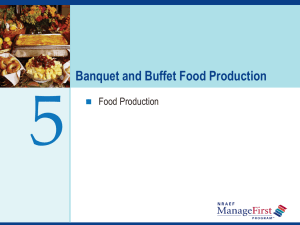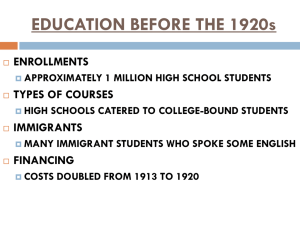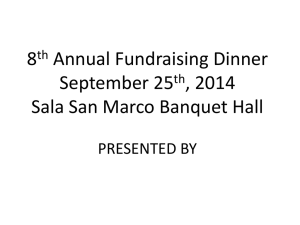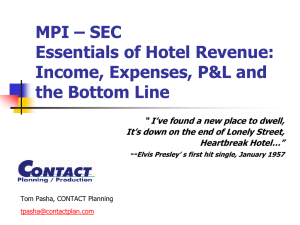Chapter 9 Managing Buffets, Banquets, and Catered Events
advertisement
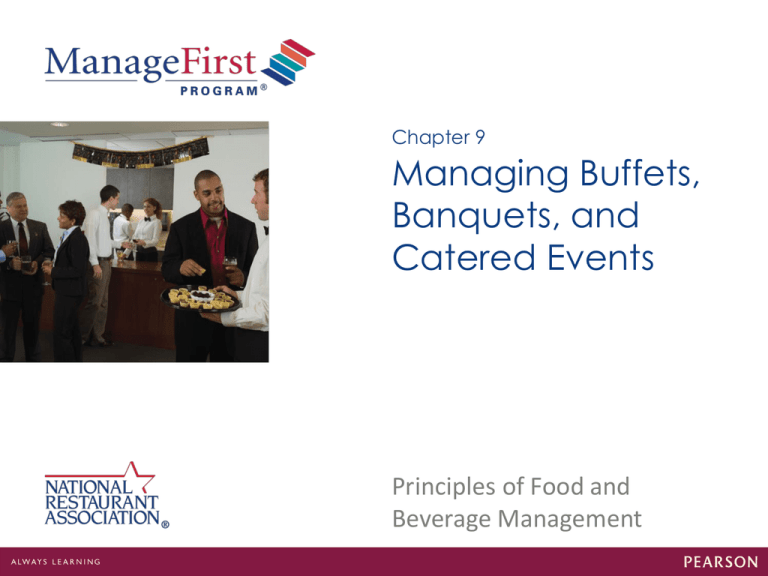
Chapter 9 Managing Buffets, Banquets, and Catered Events Principles of Food and Beverage Management Learning Objectives After completing this chapter, you should be able to: • Review procedures for effectively managing buffets. • Explain how to manage banquets. • Describe basic procedures for managing catered events. • Explain basic activities for overseeing special functions. Chapter 9 Managing Buffets, Banquets, and Catered Events MANAGING BUFFETS Buffet Menu Planning Pre -Costing Buffets Chapter 9 Managing Buffets, Banquets, and Catered Events Controlling Food Costs Food Safety and Buffets Chapter 9 Managing Buffets, Banquets, and Catered Events MANAGING BANQUETS Banquets Can Be Good Business Banquets Are Different Banquet Menu Planning Banquet Documents Chapter 9 Managing Buffets, Banquets, and Catered Events Banquet Event Order (BEO) Chapter 9 Managing Buffets, Banquets, and Catered Events Banquet Agreement Chapter 9 Managing Buffets, Banquets, and Catered Events Banquet Food Production Banquet Beverage Production Banquet Service Chapter 9 Managing Buffets, Banquets, and Catered Events CATERING Overview Off-Site Locations Chapter 9 Managing Buffets, Banquets, and Catered Events Planning and Managing Catered Events Before the Event Day of Event Staffing the Catered Event Chapter 9 Managing Buffets, Banquets, and Catered Events Catered Event Case Study Chapter 9 Managing Buffets, Banquets, and Catered Events OVERSEEING SPECIAL FUNCTIONS Chapter 9 Managing Buffets, Banquets, and Catered Events - Summary 1. Review procedures for effectively managing buffets. • A buffet allows customers to select desired menu items and portion sizes as they pass along one or more serving counters. • Buffet menu planners must consider what customers want along with space, equipment, and employee skill limitations. • Buffets can be pre-costed by estimating each item’s portions consumed and multiplying that number by the portion cost. • Totaling these results and dividing by the number of customers gives the buffet’s per-serving food cost. • Buffet food cost can be controlled if managers can reduce food waste. Chapter 9 Managing Buffets, Banquets, and Catered Events - Summary 1. Review procedures for effectively managing buffets continued… • Strategies include making it possible for customers to select smaller portions and tracking item popularity. • Food safety concerns are important, and the principles used for other styles of foodservice apply. • Special concerns involve maintaining food at the right temperature and using sneeze guards to ensure food does not become contaminated. Chapter 9 Managing Buffets, Banquets, and Catered Events - Summary 2. Explain how to manage banquets. • Banquets are events in which a sponsor pays an establishment to provide food and beverage services, usually on site. • They can be good business if they meet quality requirements and do not overtax resources. • Banquets generate additional revenues without significant additional capital. • They do require additional training. • Banquet menu planning concerns are similar to those for à la carte operations. • Differences can include equipment limitations and the use of food products that retain quality during plating and transport to the service area. Chapter 9 Managing Buffets, Banquets, and Catered Events - Summary 2. Explain how to manage banquets continued… • Banquet event orders (BEOs) detail all banquet requirements for employees. • Banquet agreements are contracts between the operation and the sponsor. • The sponsor must guarantee the number of customers, and a cancellation clause indicates financial penalties for cancellation at specified times. • There are three basic pricing plans for a hosted bar: charge by the drink, charge by the bottle, and charge by the hour. • A cash bar requires a method of tracking payments. Chapter 9 Managing Buffets, Banquets, and Catered Events - Summary 3. Describe basic procedures for managing catered events. • Catering involves the production and service of food and beverages at an off-site location. • It can generate significant levels of revenues, but attention to numerous details is required for successful events. • The event’s location is a special concern. • A detailed checklist can confirm the resources available and what must be supplied by the operation. • Before-event activities include meetings and site visits as well as menu planning and costing decisions. • Numerous production and delivery concerns are important as is the contract specifying the sponsor’s and the operation’s responsibilities. Chapter 9 Managing Buffets, Banquets, and Catered Events - Summary 3. Describe basic procedures for managing catered events continued… • A catering site manager is typically responsible for all food and beverage production, service, setup, and cleanup at the off-site location. • Another person will be responsible for food production at the establishment and loading the delivery vehicle. Chapter 9 Managing Buffets, Banquets, and Catered Events - Summary 4. Explain basic activities for overseeing special functions. • Managers who oversee special functions routinely typically have fewer challenges than those who provide these services less frequently. • Detailed information should be supplied to all employees in line-up sessions. • Managers must supervise employees during the function. • This responsibility is easier when performance standards have been established and employees trained. • Managers sometimes need to resolve unanticipated problems. • Many of these can be traced to planning errors, failure to follow plans, and misunderstandings about task responsibilities. • Monitoring systems should be used to identify and resolve problems promptly. Chapter 9 Managing Buffets, Banquets, and Catered Events Key Terms: Banquet An event in which a sponsor pays an establishment to provide specified food and beverage services to all event attendees. Banquet agreement A contract between the operation and the event’s sponsor, which specifies the responsibilities of both parties. Banquet event order (BEO) A document used by sales, production, and service staff to detail all banquet requirements. Buffet A style of foodservice in which customers select the menu items and portion sizes they prefer as they pass along one or more serving counters. Cancellation clause A document that indicates any financial penalties for cancellation at certain times before the banquet date. Chapter 9 Managing Buffets, Banquets, and Catered Events Key Terms continued: Cash bar An event during which alcoholic beverages are purchased by the event attendees. Catering The production and service of food and beverages at a location other than the establishment responsible for the event. Guarantee (banquet) An agreement about the number of meals to be provided at a banquet. Hosted bar An event during which alcoholic beverages are paid for by the event’s sponsor. Sneeze guard A see-through solid barrier used to protect food in a selfservice counter from customers who might cough or sneeze. Chapter 9 Managing Buffets, Banquets, and Catered Events Chapter Images Chapter 9 Managing Buffets, Banquets, and Catered Events Chapter Images continued Chapter 9 Managing Buffets, Banquets, and Catered Events Chapter Images continued
